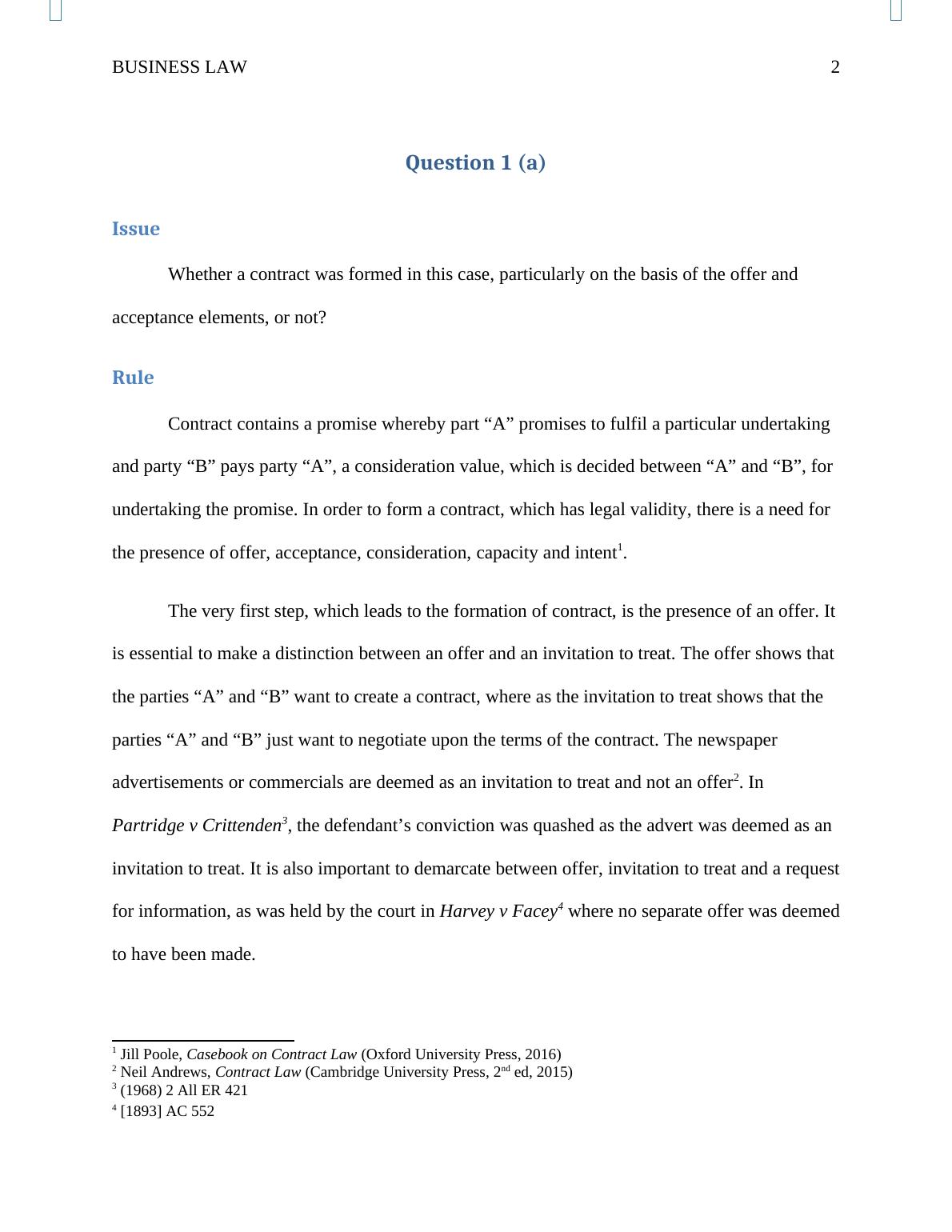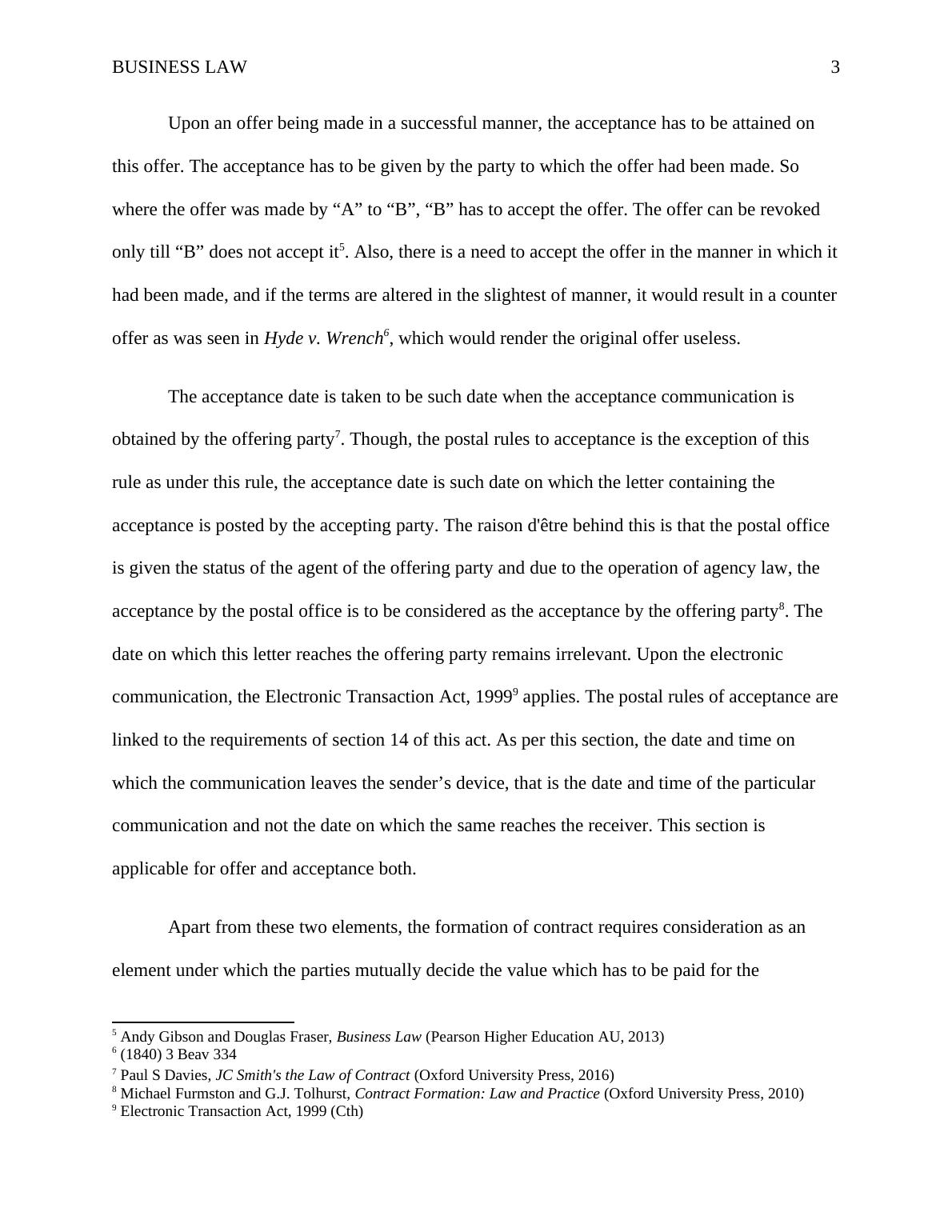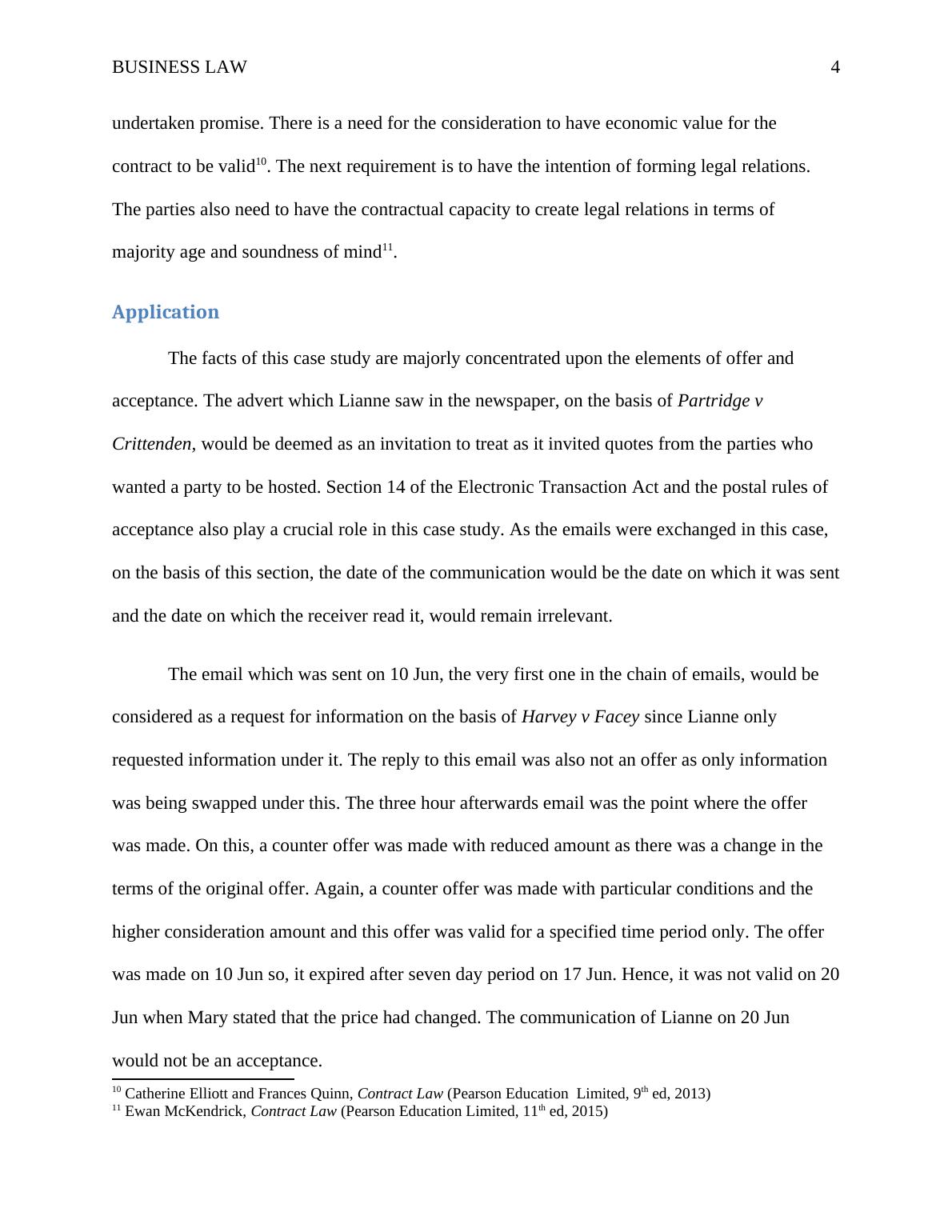BLO1105 Assignment on Business Law
Added on 2020-04-07
11 Pages2534 Words146 Views
Business LawBLO1105(Student Details: )

BUSINESS LAW2Question 1 (a)IssueWhether a contract was formed in this case, particularly on the basis of the offer and acceptance elements, or not?RuleContract contains a promise whereby part “A” promises to fulfil a particular undertaking and party “B” pays party “A”, a consideration value, which is decided between “A” and “B”, for undertaking the promise. In order to form a contract, which has legal validity, there is a need for the presence of offer, acceptance, consideration, capacity and intent1. The very first step, which leads to the formation of contract, is the presence of an offer. Itis essential to make a distinction between an offer and an invitation to treat. The offer shows that the parties “A” and “B” want to create a contract, where as the invitation to treat shows that the parties “A” and “B” just want to negotiate upon the terms of the contract. The newspaper advertisements or commercials are deemed as an invitation to treat and not an offer2. In Partridge v Crittenden3, the defendant’s conviction was quashed as the advert was deemed as an invitation to treat. It is also important to demarcate between offer, invitation to treat and a requestfor information, as was held by the court in Harvey v Facey4where no separate offer was deemedto have been made. 1 Jill Poole, Casebook on Contract Law (Oxford University Press, 2016)2 Neil Andrews, Contract Law (Cambridge University Press, 2nd ed, 2015)3 (1968) 2 All ER 4214 [1893] AC 552

BUSINESS LAW3Upon an offer being made in a successful manner, the acceptance has to be attained on this offer. The acceptance has to be given by the party to which the offer had been made. So where the offer was made by “A” to “B”, “B” has to accept the offer. The offer can be revoked only till “B” does not accept it5. Also, there is a need to accept the offer in the manner in which ithad been made, and if the terms are altered in the slightest of manner, it would result in a counteroffer as was seen in Hyde v. Wrench6, which would render the original offer useless.The acceptance date is taken to be such date when the acceptance communication is obtained by the offering party7. Though, the postal rules to acceptance is the exception of this rule as under this rule, the acceptance date is such date on which the letter containing the acceptance is posted by the accepting party. The raison d'être behind this is that the postal office is given the status of the agent of the offering party and due to the operation of agency law, the acceptance by the postal office is to be considered as the acceptance by the offering party8. The date on which this letter reaches the offering party remains irrelevant. Upon the electronic communication, the Electronic Transaction Act, 19999 applies. The postal rules of acceptance arelinked to the requirements of section 14 of this act. As per this section, the date and time on which the communication leaves the sender’s device, that is the date and time of the particular communication and not the date on which the same reaches the receiver. This section is applicable for offer and acceptance both. Apart from these two elements, the formation of contract requires consideration as an element under which the parties mutually decide the value which has to be paid for the 5 Andy Gibson and Douglas Fraser, Business Law (Pearson Higher Education AU, 2013)6 (1840) 3 Beav 3347 Paul S Davies, JC Smith's the Law of Contract (Oxford University Press, 2016)8 Michael Furmston and G.J. Tolhurst, Contract Formation: Law and Practice (Oxford University Press, 2010)9 Electronic Transaction Act, 1999 (Cth)

BUSINESS LAW4undertaken promise. There is a need for the consideration to have economic value for the contract to be valid10. The next requirement is to have the intention of forming legal relations. The parties also need to have the contractual capacity to create legal relations in terms of majority age and soundness of mind11. ApplicationThe facts of this case study are majorly concentrated upon the elements of offer and acceptance. The advert which Lianne saw in the newspaper, on the basis of Partridge v Crittenden, would be deemed as an invitation to treat as it invited quotes from the parties who wanted a party to be hosted. Section 14 of the Electronic Transaction Act and the postal rules of acceptance also play a crucial role in this case study. As the emails were exchanged in this case, on the basis of this section, the date of the communication would be the date on which it was sentand the date on which the receiver read it, would remain irrelevant. The email which was sent on 10 Jun, the very first one in the chain of emails, would be considered as a request for information on the basis of Harvey v Facey since Lianne only requested information under it. The reply to this email was also not an offer as only information was being swapped under this. The three hour afterwards email was the point where the offer was made. On this, a counter offer was made with reduced amount as there was a change in the terms of the original offer. Again, a counter offer was made with particular conditions and the higher consideration amount and this offer was valid for a specified time period only. The offer was made on 10 Jun so, it expired after seven day period on 17 Jun. Hence, it was not valid on 20Jun when Mary stated that the price had changed. The communication of Lianne on 20 Jun would not be an acceptance. 10 Catherine Elliott and Frances Quinn, Contract Law (Pearson Education Limited, 9th ed, 2013)11 Ewan McKendrick, Contract Law (Pearson Education Limited, 11th ed, 2015)

End of preview
Want to access all the pages? Upload your documents or become a member.
Related Documents
Business Law Group Assignmentlg...
|15
|2499
|339
Contract Formation and Legal Validity in Business Lawlg...
|9
|2019
|207
Assignment on Commercial Law and Contract Lawlg...
|11
|2733
|214
TLAW101 - Business Law Assignmentlg...
|9
|2035
|39
Contract and Commercial Law Assignmentlg...
|10
|2608
|32
Business Law Assignment - Contract Formation and Communicationlg...
|9
|2034
|150
